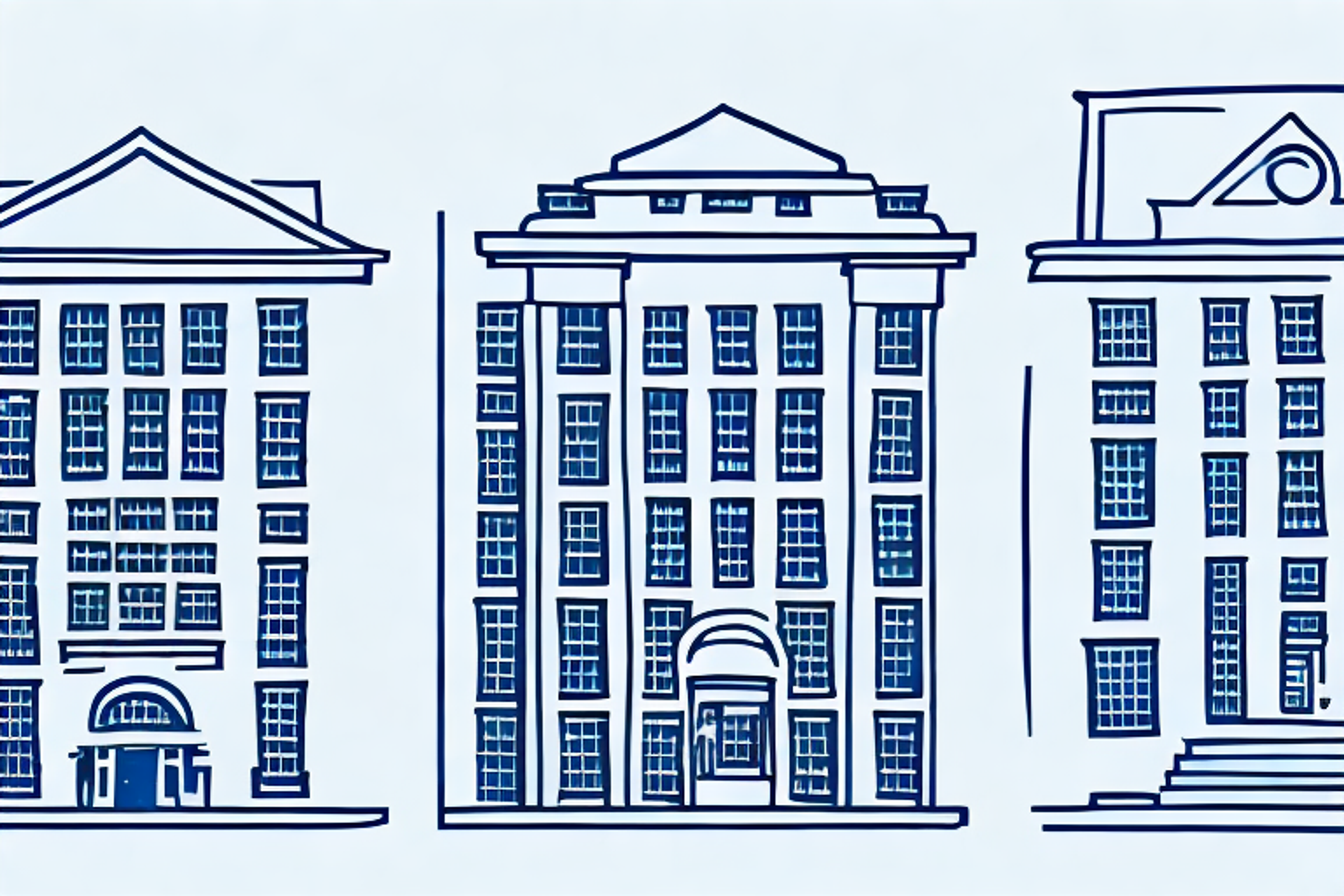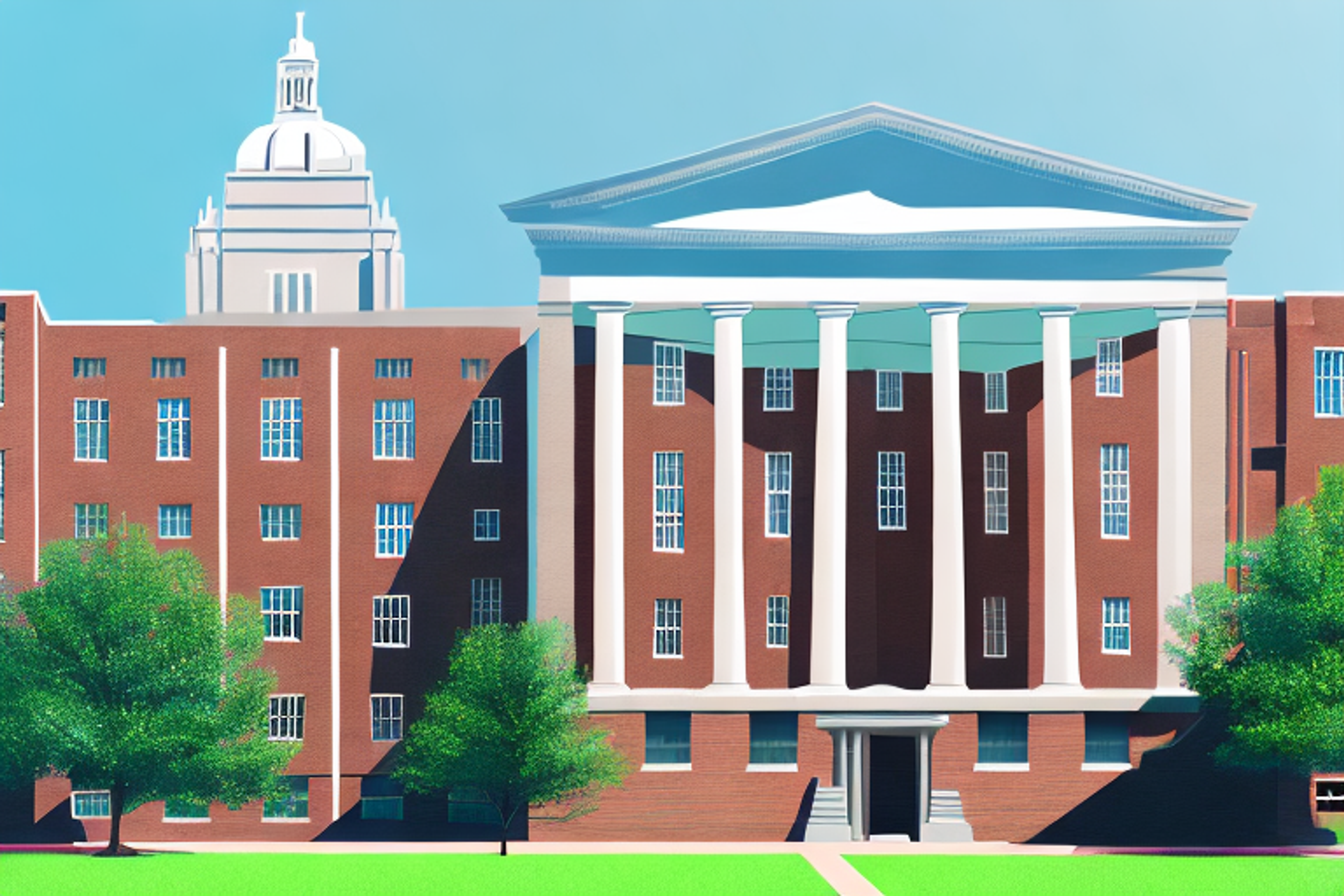University of Michigan--Ann Arbor Law School Vs. Georgetown University Law Center: An In-Depth Comparison
Discover the differences between the University of Michigan--Ann Arbor Law School and Georgetown University Law Center in this comprehensive comparison.
Posted March 6, 2025

Table of Contents
If you're weighing your options for law school, you might be wondering how one renowned institution compares to another. That's where we come in. In this article, we're going to examine the differences between the University of Michigan--Ann Arbor Law School and Georgetown University Law Center. These two schools are well-regarded and have much to offer, so let's dive in and examine their similarities and differences in detail.
Location and Setting: How Do the Two Law Schools Compare?
One of the first important factors to consider when it comes to comparing law schools is location and setting. The University of Michigan--Ann Arbor is located in Ann Arbor, Michigan, while Georgetown University Law Center is located in Washington, D.C. Ann Arbor is a charming college town that is relatively secluded and offers a slower pace of life. By contrast, Washington, D.C. is a bustling capital city with a diverse population and a plethora of exciting opportunities.
If you enjoy urban living and the excitement that comes with it, Georgetown might be the right choice for you. On the other hand, if you prefer a more traditional college experience in the serene Midwest, Michigan might be a better fit.
History and Reputation: A Look at the Legacy of UMich and Georgetown Law
Both the University of Michigan--Ann Arbor Law School and Georgetown University Law Center have a long and rich history. UMich Law was founded in 1859 and has since become known as one of the top law schools in the country. Georgetown Law, founded in 1870, is also highly respected and is particularly known for its focus on international law and policy.
So, how do these two institutions compare in terms of reputation? In short, both schools are highly regarded and respected within the legal community. However, UMich Law is generally considered to be slightly more prestigious, having consistently been ranked higher on various "best law schools" lists over the years.
Faculty and Teaching Quality: What Makes Each School's Faculty Stand Out?
Another important factor to consider when comparing law schools is the quality of the faculty and teaching. At both UMich and Georgetown Law, you'll find professors who are world-renowned in their respective fields. However, the teaching styles at the two schools differ somewhat. UMich Law is known for its emphasis on academic rigor and intellectual debate, while Georgetown Law is known for its practical, hands-on approach that prepares students for real-world legal challenges.
Ultimately, it's up to you to decide which teaching style you prefer and which approach will best prepare you for a successful legal career.
Curriculum and Course Offerings: A Comparison of the Law Programs at UMich and Georgetown
The curriculum and course offerings at UMich Law and Georgetown Law are both extensive and diverse. At UMich Law, you'll find a wide range of courses in areas like constitutional law, civil rights, and corporate law, as well as specialized "clinics" that allow students to practice law in real-world settings.
At Georgetown Law, you'll find a similarly diverse curriculum with a particular emphasis on international law and policy. Additionally, Georgetown Law offers specialized programs in areas like environmental law, national security, and health law.
Ultimately, the curriculum and course offerings at each school are designed to provide a well-rounded legal education that prepares students for a variety of legal career paths.
Student Life and Extracurricular Activities: A Look at the Social Scene on Campus
Law school is hard work, but that doesn't mean you can't have fun while you're at it. At both UMich Law and Georgetown Law, you'll find a vibrant social scene with plenty of extracurricular activities to get involved in. UMich Law has a variety of student organizations, including clubs focused on different areas of the law, as well as a moot court program that allows students to practice their legal skills in a competitive setting.
Georgetown Law also has a wealth of extracurricular activities, including clubs focused on public interest law, sports law, and more. Additionally, Georgetown Law is located in Washington, D.C., which means that students have access to a wealth of museums, restaurants, and other cultural attractions.
Ultimately, both schools offer a rich social experience that allows students to connect with others who share their interests and passions.
Admissions Requirements and Selectivity: What Are Your Chances of Getting into UMich or Georgetown Law?
Of course, all of this discussion about the differences between UMich Law and Georgetown Law is moot if you can't get in. So, let's take a closer look at the admissions requirements and selectivity at each school.
UMich Law is highly competitive, with a 16% acceptance rate. To be considered for admission, you'll need a strong undergraduate GPA, LSAT score, and personal statement. Additionally, UMich Law values diversity in its student body, so highlighting your unique experiences and perspective can help your application stand out.
Georgetown Law is similarly competitive, with a 17% acceptance rate. Like UMich Law, Georgetown places a strong emphasis on academic achievement and a well-rounded personal statement that showcases your experiences and goals.
Ultimately, getting into either school requires a lot of hard work and dedication, but if you have what it takes, the rewards can be immense.
Career Opportunities for Graduates: A Comparison of Employment Rates, Salaries, and More
One of the biggest considerations when choosing a law school is how it will help prepare you for a successful and fulfilling legal career. So, let's take a closer look at the post-graduation career opportunities for UMich Law and Georgetown Law graduates.
UMich Law graduates are highly sought-after by employers and have a consistently high employment rate. In fact, UMich Law has one of the highest employment rates of any law school in the country, with 97% of graduates finding employment within ten months of graduation. Additionally, UMich Law graduates earn a median starting salary of over $160,000.
Georgetown Law graduates also have a strong track record of post-graduation success, with a 90% employment rate within ten months of graduation. Georgetown Law graduates also earn an impressive median starting salary of over $170,000.
Ultimately, both schools offer excellent employment prospects and can help prepare you for a successful career in the legal field.
Alumni Network and Connections: How Can Graduates Benefit from Their School's Network?
When it comes to networking and connections, both UMich Law and Georgetown Law have a lot to offer. UMich Law has a vast alumni network with over 20,000 graduates worldwide. Additionally, UMich Law has a robust mentorship program that connects students with alumni who can offer guidance and career advice.
Georgetown Law also has a strong alumni network, with over 18,000 graduates worldwide. Georgetown Law frequently hosts alumni events, and graduates are often eager to mentor current students and help them succeed in their legal careers.
Ultimately, both schools offer plenty of opportunities for graduates to connect with their alumni network, which can be invaluable when it comes to finding jobs and building professional relationships.
Diversity and Inclusivity: An Exploration of the Student Body Makeup at Both Schools
Diversity and inclusivity are important considerations when choosing a law school. Fortunately, both UMich Law and Georgetown Law are committed to creating a welcoming and diverse community.
UMich Law has a diverse student body, with underrepresented minorities making up approximately 16% of the student population. Additionally, UMich Law has a number of programs and initiatives designed to promote inclusivity and diversity on campus.
Georgetown Law also places a strong emphasis on diversity and inclusivity. The school has a variety of student groups focused on promoting diversity and inclusion, and Georgetown Law frequently hosts events that celebrate and promote diversity.
Campus Resources and Facilities: From Libraries to Moot Courtrooms, Which School Has the Best Resources?
When it comes to law school, having access to the right resources and facilities can make a big difference in your academic success. So, which school has the best resources?
UMich Law has a state-of-the-art law library that offers students access to a vast collection of legal resources. Additionally, UMich Law has a modern moot courtroom, where students can practice their legal skills in a realistic setting.
Georgetown Law also has a top-notch law library and a variety of facilities designed to support students in their academic endeavors. Georgetown Law's moot courtroom is particularly noteworthy, as it is one of the most advanced in the country.
Ultimately, both schools offer excellent resources and facilities that can help students succeed academically.
Cost of Attendance and Financial Aid: An Analysis of Tuition, Fees, Scholarships, and Loans
Of course, the cost of attendance is an important consideration when choosing a law school. So, how do UMich Law and Georgetown Law compare?
UMich Law is known for its relatively affordable tuition, with in-state students paying approximately $58,000 per year and out-of-state students paying approximately $66,000 per year. Additionally, UMich Law offers a variety of financial aid options, including scholarships and loans.
Georgetown Law is slightly more expensive, with tuition and fees totaling approximately $73,000 per year. However, Georgetown Law also offers a variety of financial aid options, including scholarships, grants, and loans.
Ultimately, the cost of attendance at each school will depend on a variety of factors, including residency status and financial need. However, both schools are committed to making a legal education accessible and affordable for all students.
Student Support Services: How Do UMich and Georgetown Help Their Students Succeed Academically?
Finally, both UMich Law and Georgetown Law offer a variety of student support services that can help students succeed academically. UMich Law has a comprehensive academic support program that provides students with individualized tutoring and academic coaching as needed. Additionally, UMich Law has a variety of wellness resources, such as mental health counseling and stress-reduction programs.
Georgetown Law also has a robust academic support program, including one-on-one tutoring and workshops on legal writing and research. Additionally, Georgetown Law has a variety of wellness resources, including counseling services and yoga classes.
Ultimately, both schools are committed to supporting their students and helping them achieve their academic goals.
Research Opportunities for Students and Faculty: A Look at Scholarly Pursuits at Both Schools.
Finally yet importantly, research opportunities are crucial for law schools to give students the chance to delve into scholarly pursuits and legal research. At both the University of Michigan--Ann Arbor Law School and Georgetown University Law Center, students have numerous opportunities to engage in legal research and scholarship alongside faculty members. This may include conducting research projects, contributing publication pieces, participating in conferences and guest lectures, as well as leveraging externship programs in Washington DC and Michigan areas.
Conclusion: Which Law School is Right for You?
After examining all of these factors, you might be wondering which law school is the right choice for you.
The truth is, both UMich Law and Georgetown Law are highly respected institutions with much to offer. Ultimately, the decision of which school to attend will depend on your personal preferences, academic goals, and career aspirations.
Consider visiting both campuses, talking to current students and alumni, and researching the curriculum and faculty to determine which school is the best fit for you. Whatever you choose, a legal education from either UMich Law or Georgetown Law is sure to lay a strong foundation for a successful legal career.











